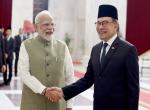Muzaffarnagar is a district of Uttar Pradesh, the headquarters of which is about a hundred miles from Delhi on the main highway leading to Roorkee, Dehradun and beyond. The district is very largely canal irrigated and is known as the sugarcane capital of India. It is, therefore, a prosperous district. Its population is divided between different castes and religions, but the Muslims form about 18.5 percent of the population and there is also a sizeable number of Jats. When Chaudhary Charan Singh was the dominant leader in U.P, he had an electoral alliance in western U.P. between Jats and Muslims and by and large these communities co-existed without much friction. Unfortunately, since then the politics of U.P. has become highly divisive.
Like Bihar, U.P. has also become an epicentre of caste and communal politics, in which no political party can claim the moral high ground. For example, during the last election to the State Assembly whenever Rahul Gandhi visited a district where there was a sizeable number of Muslims, he sported a fortnight old beard, thinking thereby that the Muslims would take him to be one of their own. The appeal to the Muslims was blatantly communal and, to add insult to injury, doubts about the veracity of the Batla House encounter in Delhi where a police inspector was shot dead by terrorists were raised and it was projected as a possible false encounter. The Muslims, not being terrorists at heart, firmly rejected this ploy, but in the minds of people at large an impression remained that Azamgarh District is the breeding ground for terrorists and that Muslims are sympathetic to communal terrorism. Unfortunately, the Congress has still not woken up to the fact that the Muslim of 2013 is not the Muslim of 1947. To him India is home and he wants to live here securely, confident that he will get a fair share of the development pie. To single him out as being different from others and then to seek his vote is an insult to the Muslims besides militating against the basic secular tenor of our Constitution and our society.
The Samajwadi Party, whose leaders such as Mulayam Singh Yadav and Akhilesh Yadav try and masquerade as Muslims by donning skull caps, has made a blatantly communal appeal to the Muslims, based on religion and on creating a sense of fear amongst the minorities about possible domination by the majority community. The Samajwadi Party has done this because it is confident that regardless of what concessions it makes to the Muslims, it has a secure Other Backward Classes (OBC) constituency and that Yadavs, Ahirs and Gujars in will any case vote for the Samajwadi Party. In this cauldron of caste politics, Mayawati’s appeal is to the scheduled castes, more specifically the Chamars, though she has made some inroads into the Muslim vote bank and also has some upper caste Hindus supporting her. The BJP, knowing that in U.P. it will not get Muslims votes, is dependent on its upper caste Hindu votes and has reached out to the Jats. Viewed in totality, politics in U.P. has nothing to do with ideology, programmes or a development agenda. In the caste and religious divide, where honest officers are shunted around very rapidly, the discretion of the District Magistrate and Superintendent of Police to act independently to maintain law and order is severely constrained by political interference and all this has wrecked the administration almost completely.
The Constitution vests the executive powers of the Union in the President who exercises them through officers subordinate to him. In the States, the executive power vests in the Governor who exercises such power through officers subordinate to him. The Seventh Schedule of the Constitution gives the legal competence of Parliament, the State Legislature and of both of them concurrently to enact laws as per Lists 1, 2 and 3 of the Seventh Schedule. List 1, the Union List, gives the authority to Parliament to legislate on the defence of India, the armed forces and deployment of such forces in aid of the civil power in a State. List 2, the State List, empowers the State Legislature to legislate on matters relating to public order and the creation and maintenance of the police. List 3, the Concurrent List, permits both Parliament and the State Legislatures to enact laws on criminal law, criminal procedure and preventive detention. Within the competence prescribed in the Seventh Schedule and the laws framed thereunder, it is for the executive government at the Centre and in the States to enforce the law and to implement the mandate of the Legislature as prescribed by law. Therefore, it is for the Executive to create an environment of law and order, public peace and security against external aggression which would permit the people of India to have justice, liberty, equality and fraternity. The maintenance of law and order and the promotion of public peace, therefore, become the fundamental duty of government. This duty is given in the Indian Police Act and the Police Acts which refer to specific areas such as the Delhi Police Act. The Code of Criminal Procedure, which provides for the creation of an Executive Magistracy, lays down the duty of the Magistrates and the police to maintain public order. The Code of Criminal Procedure vests both preventive and coercive powers in the Executive Magistracy and the police. Chapter XI of the Code directs the police to prevent the commission of cognizable offences and to make arrests to prevent such commission. Chapter VIII empowers the Executive Magistracy to bind over any person who is likely to indulge in acts which disturb public peace or lead to the commission of cognizable offences and in lieu of security for good behaviour commit the person to prison for the period of the bond. The Executive Magistracy and the police, therefore, have adequate legal powers to take preventive action and thus maintain order.
Chapter X enjoins upon the Executive Magistracy and the police to maintain public order, disperse an unlawful assembly, use necessary force to enforce an order of dispersal and if civil force proves inadequate to the task, then the senior most Executive Magistrate may requisition the service of the armed forces and direct the commanding officer to take necessary steps to disperse the assembly and restore order. Under section 144 and 144-A, Cr.P.C, an Executive Magistrate may issue a prohibitory order directing a particular person or people at large to desist from doing an act or acts which can lead to a disturbance of public peace or create a nuisance. To this can be added Chapter IV, Cr.P.C. which in section 37 makes it compulsory for every person to assist the Magistrate or a police officer demanding his aid and under section 39 to give information to the police about the commission or intention to commit the offences given in section 39. The scheme of the law is that not only must the Magistracy and the police prevent the commission of offences, but they must also take effective action to maintain public order and for this purpose members of the public at large are required by law to assist the police and the Executive Magistracy.
It might be noted that nowhere does any law state that an Executive Magistrate or a police officer is required to seek the orders of either a superior officer or of a politician in order to perform the duty of maintaining public order. In fact, no minister, no government officer, no political functionary has any role to play in the matter of preventing a breach of peace and only a superior Executive Magistrate or police officer under whom the area Magistrate or police officer functions may give any directions in this behalf. In the matter of maintenance of public order, the District Magistrate is King and the Superintendent of Police is both Prime Minister and Commander-in-Chief. That is how our system functioned when I was a District Magistrate. Neither my S.P. nor I sought orders from government, nor did government give us any directions in matters which related to the maintenance of public order. We took our duty seriously, the police took preventive action whenever trouble was brewing, we issued prohibitory orders where necessary, we intervened at the earliest juncture when we sensed that the situation merited it and we had no hesitation in using necessary effective force to ensure that no rioting or public disturbance took place. As a result of this, whenever an ugly situation developed the local authorities took immediate action and by and large public order was maintained.
Let me give one example. From early 1965 to the third quarter of 1967, I was District Magistrate of Ujjain and the finest police officer I have had the honour to serve with, Ramrao Dube, was the Superintendent of Police. In 1966, student trouble took place all over India, the United States and much of Western Europe. We had some problems in Ujjain also, but the S.P. and I decided that university students would not be allowed to take to the streets. We liaised with the university authorities, but unfortunately one of the very respected and senior teachers, who went on to be a very distinguished Vice Chancellor of the university, decided not to use his moral authority to keep students under control. The students tried to defy the prohibitory order, the police did not permit the students to advance into the streets, there was considerable stone pelting which injured a number of policemen, including the S.P, who had five broken ribs and we had to resort to the use of force. The S.P. was determined not to use lethal force and kept the armed party under his direct control. We were able to clear the educational premises, the injured on both sides were admitted to hospital and I decided to keep the city under curfew till tempers cooled. When some ministers decided to play politics, I requested the Chief Minister to stop them from coming to Ujjain and a couple of political luminaries who did come were reminded that the city was under curfew and they would not be allowed to move around the town. Peace was restored in quick order, I took the students for a picnic where their hockey team beat the district team and we soon became fast friends. Nevertheless, neither the S.P. nor I had any doubt as to how we would deal with the situation and Ujjain has never had any real trouble since then. We were given a very free hand because that is what the law states.
I contrast this with what happened in Meerut in the early eighties of the last century, including the infamous Maliana massacre. Meerut witnessed a number of communal clashes and the army had to be summoned repeatedly. I asked the D.M. and S.P. of Meerut why they could not control communal violence. The D.M’s answer was classic. He said, “For 364 days in the year, we are summoned to the Circuit House by some visiting minister or the other and lolling on the sofas by the side of the visiting minister are the local political goondas. The S.P. and I are lucky if we are offered a chair, but we have to swallow the insults of the political goondas and the orders of the minister to do what these people demand of us. On the 365th day when the same political goondas foment trouble, we are asked to deal with them harshly. Neither I nor the police force are schizophrenic so that one persona of ours cringes before trouble makers for much of the year and then another persona is required to take over in order to deal severely with these very people. Give us a free hand and I guarantee there will be no riots”.
Another example is of West Bengal where in the seventies of the last century the Left Front ordered that the police would not intervene in industrial disputes, despite the fact that 00workers physically restrained, through gherao, the management’s freedom of movement. This amounted to an offence of illegal restraint and intimidation, but the West Bengal Police was not permitted to act. Soon the police realised that in every matter, including crucial law and order issues, it was necessary to obtain political clearance before action could be taken. This was the end of effective policing in the State and ushered in an era of lawlessness which was exploited first by Left Front workers and now by the Trinamool Congress workers. Once the police stops functioning independently, the virus of lawlessness is bound to assume a dirty and virulent communal form and this is precisely what we have witnessed in Muzaffarnagar and other districts of western U.P.
It is increasingly clear that the district administration in Muzaffarnagar and surrounding districts of Meerut and Saharanpur Divisions stands emasculated. In Muzaffarnagar there was an altercation between a Muslim boy and two Jat boys. This escalated into a fight in which one Muslim boy and two Jat boys were killed. Had the administration intervened immediately and forcefully, then within the first hour of the incident the matter could have been contained. Instead, the district administration did nothing and the flames of communal passion engulfed large parts of Meerut and Saharanpur Divisions. The problem with the government in U.P. is that it is openly wooing the Muslims and did not want action against Muslim law breakers in Muzaffarnagar and elsewhere. At the same time, the Jats are a very substantial and aggressive community which has a high degree of social cohesion. This community would certainly not take any insult or injury lying down. Incidentally, the Jats contribute large numbers of soldiers to the Indian Army and they have fighting skills. The government does not want to antagonise the Jats and, therefore, fell between two stools in which keeping the Muslims happy on the one hand and Jats on the other became two such contradictory poles that whatever government did was bound to be wrong. The political interference of government, not only in this incident but over a long period of time has resulted in officers vested with the power and the duty to maintain public order not acting, large numbers of people being killed and houses being set on fire and about fifty thousand people becoming refugees. All this happened within a hundred miles of Delhi, the national capital. And they call this a government!
The Central Government, though not directly responsible for law and order, is nevertheless the guardian of the Constitution. Its responsibility, therefore, to maintain public order becomes all the more important because under our Constitution residuary powers vest in Parliament, under Article 256 the Union Government can give directives to States to ensure that a constitutional and legal structure is properly maintained and, if necessary, assume all or any of the functions of a State under Article 356. What is more, the D.M. is an IAS officer and the S.P. is an IPS office, both belonging to All India Services, whose ultimate rule making control vests in the Central Government. To remind them that they are servants of the law and not of the political executive of a State is well within competence of the Central Government. However, the response of the Central Government to the Muzaffarnagar situation is weak and indecisive and that is because the Centre does not want to annoy the Samajwadi Party and, therefore, it is prepared to tolerate the massacre in Muzaffarnagar but will not annoy Mulayam Singh Yadav. What should have happened is that within twenty-four hours of the start of the episode of rioting, the Union Home Minister should have visited Muzaffarnagar and, regardless of how the U.P. Government would react, he should have told the D.M. and the S.P. that if within the next twelve hours the situation was not controlled the Central Government would dismiss both of them without an enquiry under Article 311 (2) (b) and (c). The message being conveyed would be that even within the federal structure of India, All India Service officers charged by the law to exercise certain authority are expected to exercise such authority without looking for political directions and on their failure to do so, the Central Government would intervene and dismiss them from Service. If even two officers are dismissed in this manner, I will bet my last rupee that no D.M. or S.P. in India will be able to offer the excuse of being fettered by the State Government when dealing with a law and order situation. For them, the alternative to failure would be dismissal from Service. This should ginger them up in doing their duty. This would ensure peace and public order in India and that should be most welcome. This is vitally important because in the past whenever there have been communal riots it is because the district administration and the police have failed to function.
Therefore, the answer to all communal riots is independent action by the Executive Magistracy and the police and the formula I have suggested of immediate dismissal by the Centre of IAS and IPS officers who do not do their duty. This would certainly make the district administration function. Is the Prime Minister listening?
Published Date: 24th September 2013, Image Source: http://www.firstpost.com









Post new comment